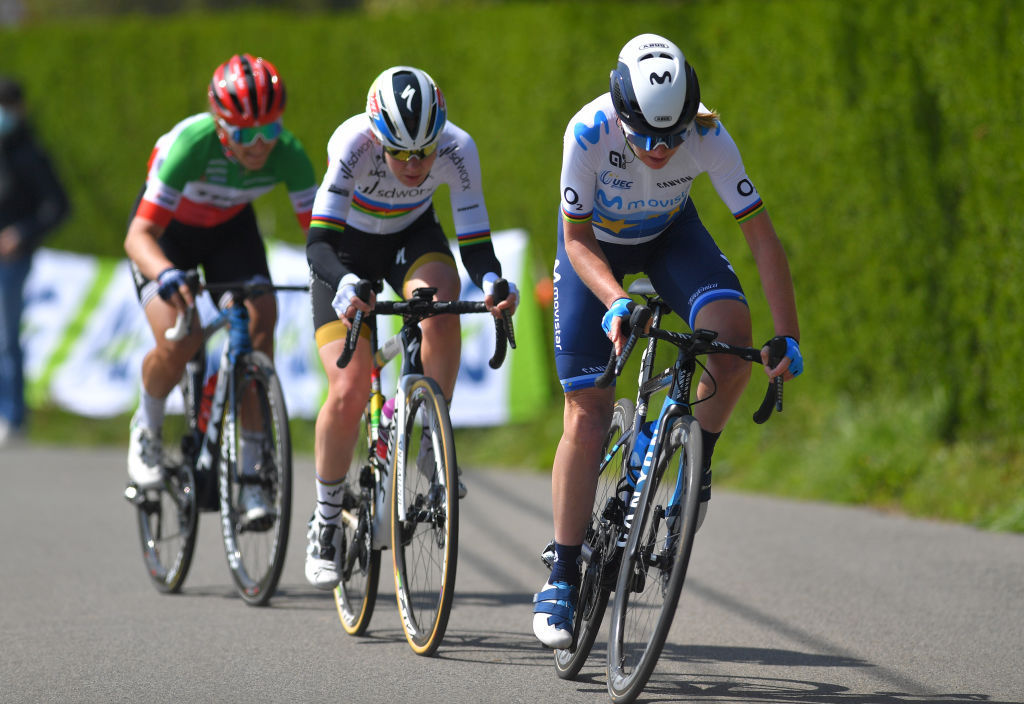Van Vleuten second in Liège-Bastogne-Liège after headwind foils attack plans
Movistar rider settles for second behind Vollering but remains on track with Olympic Games preparations

Coming into Quai des Ardennes in Liège, a new and somewhat fast run-in to the finish line, Annemiek van Vleuten (Movistar Team) knew all too well that Demi Vollering (Team SD Worx) was the fastest sprinter in the slim group of favourites contesting the win in Liège-Bastogne-Liège. That didn’t stop the European champion from trying.
"I hoped to maybe do a Kasper Asgreen, [I was] inspired by him in the Tour of Flanders. You never know after a hard race. In the end, I came close,” Van Vleuten explained, laughing while describing her sprint attempt.
The 38-year-old came to Liège-Bastogne-Liège Femmes looking for her first win in this year’s Ardennes. Supported by a versatile roster from Movistar, Van Vleuten already claimed victories in the Tour of Flanders and Dwars door Vlaanderen but was unable to break clear of the favourites group on the hills of Limburg and Wallonia.
She took third and fourth places in Amstel Gold Race and La Flèche Wallonne respectively, in both seeing the victory go in the final meters. In Valkenburg, she lost the sprint to Marianne Vos and Demi Vollering, and on Mur de Huy she was not able to follow Anna van der Breggen and Katarzyna Niewiadoma, only to be then denied the third spot by sprinting Elisa Longo Borghini.
In classics, Van Vleuten has often opted to launch attacks on relatively longer climbs, hoping to drop her opponents and then time trial her way to the line, something of a trademark she secured in recent years. This year on the way to Liège these plans were foiled not just by lack of cooperation among those on her wheel but by a strong wind.
“I wanted to wait for one final attack on Roche-aux-Faucons, but I was not able to drop Anna [van der Breggen] and then I knew Cecilie [Uttrup Ludwig] didn’t want to ride with me. It was quite hard and on top of that, there was so much headwind… if it came together, they would chase me down. It was a hard situation to be aggressive,” she told Cyclingnews at the finish line.
Van Vleuten put the field to the test on the last climb of the day and once more after cresting the summit. She managed to drop Marianne Vos, Cecilie Uttrup Ludwig and cause trouble for Demi Vollering and Niewiadoma but on the flat run-in to Liège she still found herself in a group of five. With a strong headwind and Anna van der Breggen driving the pace, Vollering looked ready to finish off the job and take the win with the help of the rider whose footsteps she hopes to follow.
Get The Leadout Newsletter
The latest race content, interviews, features, reviews and expert buying guides, direct to your inbox!
“I decided that if someone in the group would attack, I would immediately attack afterwards. But I didn’t want to be the first one to attack because that has no chance. Everyone waited for the sprint," Van Vleuten explained.
Asked if it is getting harder for her to drop key opponents in the Olympic year, Van Vleuten pointed to the characteristics of the Spring Classics and their significance in the build-up to the Olympic Games.
“I also know from 2016 that the level, especially in the spring, is higher than normal, everyone needs to get selected for the Olympic Games. I can feel that. On top of that, I think last year I profited from staying quite motivated in the lockdown in Covid-19 period,” she said, affirming that her own preparations for races in Tokyo are on track.
“I can say I came out maybe with the best shape out of this period. I still kept my motivation to keep on training, while my Italian and Spanish colleagues were really in lockdown, so for them, it was really hard to stay motivated training inside. You could see at the end of the season that the level was normal again and I think the level this year is even higher,” she concluded confidently.